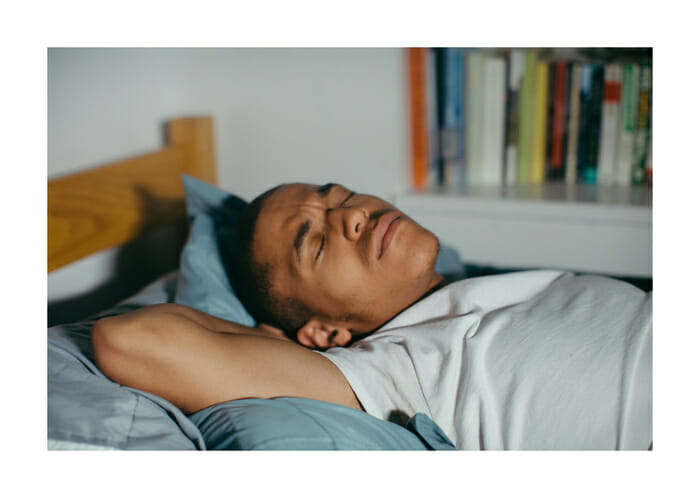Interview 077 • Feb 20th 2020
- Interview by Lou Noble, Portraits of Myles Loftin by Makeda Sanford
About Myles Loftin
Myles Loftin recognizes the latent power that images hold , and seeks to utilize that power as a means for creating positive change. He is a photographer, director and a senior in the BFA Photo program at Parsons School of Design.
With a practice that blends portraiture, fine art and fashion photography, his photos exude a feeling of vibrance, freedom and youth. Loftin’s work deals with themes of blackness, identity, and representation of marginalized individuals. His subjects are often times friends, family members and members of the LGBTQ+ community.
Links
Foreword
Of course there's value at talking to well-established photographers, ones with decades-long careers, who've seen it all, yeah?
But what's just as fun is talking to people closer to the beginning. Myles, while having already accomplished so much, still has a whole life, a whole career ahead of him, and it was fantastic getting to chat with him, see how his thoughts and work are evolving at this early phase, hear him talk about what the future holds, how he's being shaped by experience and formal education in the arts.
This interview has been edited for length and clarity.
Interview
What are you doing for your last year in school?
This semester, I’m taking five classes. So I have my thesis class, which is basically a studio class to work on our thesis and brainstorm ideas. Pretty good type of stuff. Then there’s a professional practices class, which teaches you about the business side of photography. And then I’m taking this class called Queer Visuality, and it’s basically just about sourcing archival images and trying to uncover queer history through photography. So that’s been really interesting. And then I’m taking this other class called Photography as Expanded Media, and that’s about how you can use different forms of image-making to challenge what it means to make a photograph, or what a photograph can be.
My teacher, she was showing us books of artists who were thinking outside the box, in terms of photography, and there was this one photo, it was a photograph, technically, but it was literally just a swipe of inkjet ink and she’s like, “well, it’s ink on paper. Technically it’s a print…is it a photograph?” Stuff like that. And also just thinking about technology and also installation stuff, because I’ve been interested in seeing how my work could also translate into physical objects. If I were to like show it in a gallery space or whatever and then, what other class…I just signed up for a history of couture class.
Oh nice.
Yeah. I had swapped it out because initially I signed up for this cinematography class, but the way they were teaching it was almost kind of like a basic photography class. So it would have been going over aperture and ISO, stuff I already know. And I think they had designed it for people who don’t necessarily have much experience with image-making, so I just exchanged classed. But this new class is really interesting. I knew that there was a lot to know about fashion, but when you really hear it, it’s so much. My class is like only two hours but there was just so much information, it was a lot.
But you’re digging it?
Yeah. It’s interesting so far. I’ve never really gotten that much into the actual history or gone in-depth with fashion. So it’s interesting to get a more in-depth perspective about it. Yeah, other than that, that’s pretty much all I’m doing. Well, I mean that’s a lot to be doing at school! And then outside of that I’m freelancing here and there, whenever I can like fit in my schedule.
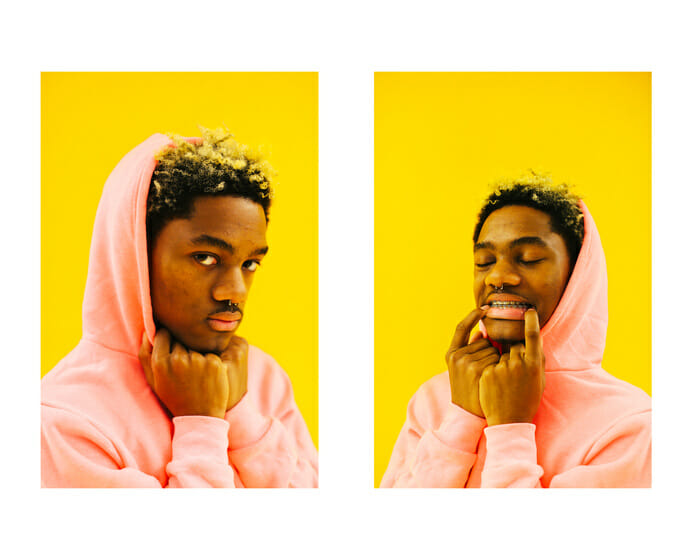
Do you feel like going to Parsons has really helped your photo-practice?
In some ways. I don’t think it’s been a huge help in my practice. I mean, it’s definitely made me think more about what I’m saying with my work. And how to communicate that, and how to challenge myself more. And also just getting feedback and stuff, because, say for instance if I wasn’t school and I was just making work and putting it on the internet. I wouldn’t have as much of a gauge of, you know, where I’m going with my work. Because like I feel like when you post stuff on Instagram, people who follow you are just going to say nice things for the most part, and people who are saying mean things are just saying it just to be mean and not to be constructive.
So like I feel like being in the classroom, it gives you that space to show stuff and have a conversation and people tell you things that you may not have thought about, and then you see other people’s stuff and you’re inspired to do something. So that’s definitely been a great part of it. Yeah, and also I just think, in terms of fashion photography, a lot of photographers don’t necessarily have…they’re just making beautiful pictures or whatever, but there’s no depth to it. And I feel like when you have a background and knowledge in the history of photography and stuff like that it helps you.
There’s very few things that I see on the internet that stick with you, where you remember that image a week later, two weeks later.
Has school helped you appreciate that kind of thing?
Yeah, and also, I feel like school helped me appreciate the process of creating a body of work. Understanding that it’s something that really takes time, and it opened my mind to like, “okay, this is not something that is going to happen overnight.”
Right.
Or happen quickly.
How are you feeling about your work right now?
I feel pretty good about it. I mean, in terms of my thesis, I’m still not a hundred percent sure where I want to go with it. I know, for the most part, what I want to do, I know it’s going to have to do with black queerness, definitely portraiture. When I was in London, I was looking at a lot of archives of African-Americans from like the 1800s, those old black & white photos and stuff, and just thinking about how I can reference those in the portraits that I’m making of queer people, because there’s not really a lot of history of us. We kind of have to infer when we look at images.
A lot of what the class that I’m taking is, they talk about how a lot of queer history through photography is just, it’s seeing things and trying to create stories when you see a photo of two men together. You don’t necessarily know if they were in a relationship but because we don’t have that knowledge, because people weren’t allowed to talk about that stuff. We don’t really know. So all we have is basically our imagination.
We have to read between the lines.
Yeah.
They’re just two friends that live together for 50 years!
Exactly, stuff like that! Yeah, that’s what I’ve been thinking about in terms of what I want to do with my work going forward.
That’s one thing I like, I’m always like thinking about and I’m like, does my stuff look like my stuff or does it look like, because I like, you know sometimes you see stuff and it’s like this looks like something I just saw like in this magazine by this other photographer and like, but it’s all, I wonder sometimes if my stuff is like that, so it’s like nice to hear when like people say stuff like that.
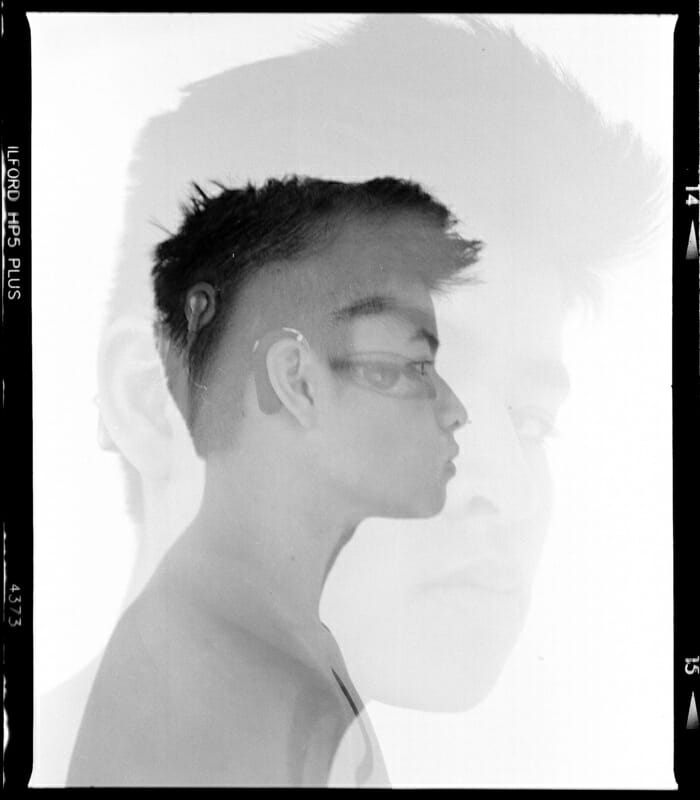
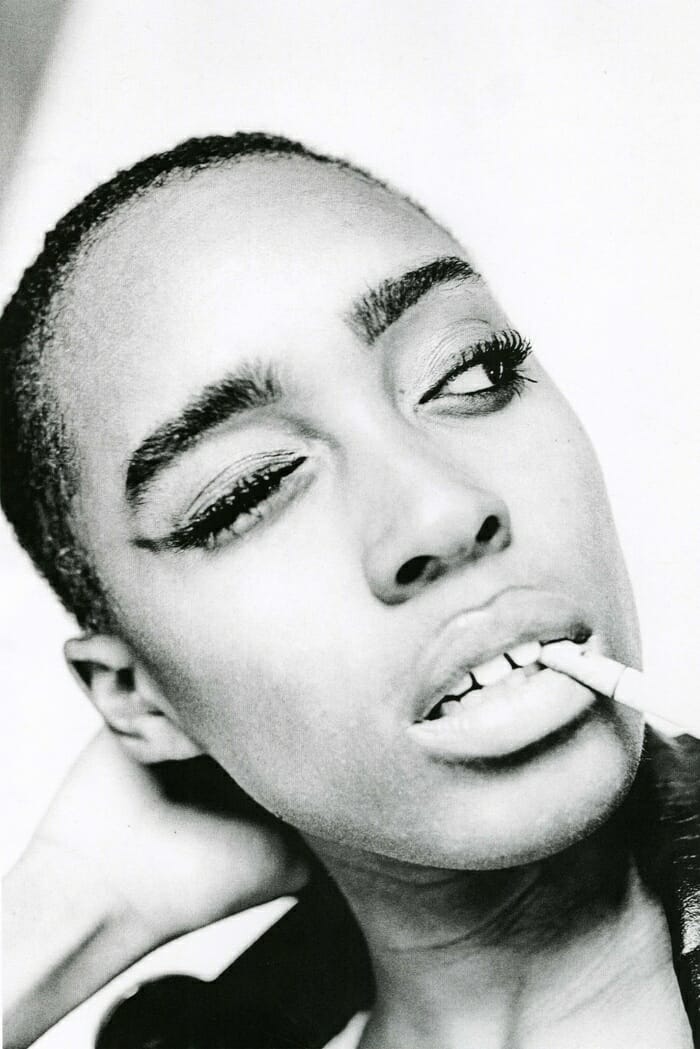
Do you have a description in mind for your own work?
Yeah, I guess so. It’s always that one question I get in interviews or it’s like, “what are three words you would use…?”
Use as many words as you want!
Vibrant, youthful, free. I like to show an intimacy between my subjects and the audience. A connection.
Do you have methods for creating that intimacy?
When I start photographing someone, I get in a mode and, I’m not even conscious of it, but people have told me that I make them feel comfortable when I photograph them. So I don’t know…I’m very patient. I take my time when I’m photographing people, I don’t try to impose too much on the person that I’m photographing. Other than creative direction, I’ve tried to let the person’s essence, or whatever you want to call it, come out in the photograph.
Do you talk to your subjects a lot during your shoots?
Not a whole bunch. Sometimes people who aren’t used to being in front of the camera get a little awkward when that happens. They’re like, “what do you want me to do?” Sometimes I’ll just look at them and just see their posture, things they do or accents, or see them do something that I saw them do. But if they’re not used to it, they’re like, “okay, you’re just looking at me, what’s going on?”
Is physical proximity to your subject something you think about?
Yeah, I don’t do a lot of full body shots. I definitely lean more towards closeness. I guess that also ties into the whole intimacy thing, I know when I see photographs that other people have taken of a close-up portrait, you just get a feeling. It almost feels like the person’s actually staring at you, if it’s a really good portrait, you know?
Right, right.
So I think that’s why I like doing that type of thing.
What is it about intimacy that draws you in and makes you want to create photos like that?
I’m interested in interesting people, and I want to share those interesting people with the world. I am also interested in fashion photography, just not as big scale, at the moment. I do like very DIY-type stuff, an at home/intimate/with friends type thing.
And even when I do do commercial stuff, I still like work that way. I just did a job where the whole brand messaging was DIY. I literally shot in this parking lot over by my apartment, and did this really cheap set up and shot it on VHS, stuff like that.
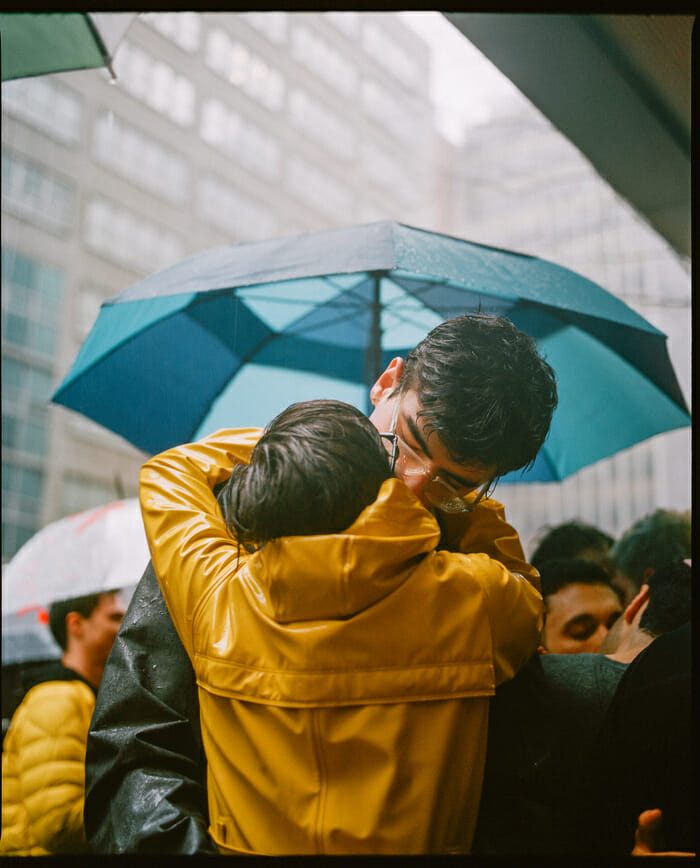
What is it that appeals to you about it?
I think it’s maybe because that is what I got started with and so it feels most familiar. I think I’m most comfortable with it because that’s how I got started and that’s what I’m most comfortable with.
Are you drawn to that in other photographers’ work, as well?
Yeah. I feel like the stuff that I’m most drawn to at the moment is stuff that (and I think that’s a trend in general at the moment) is…the whole natural-type thing. It doesn’t feel like this big production, how images used to be up in the 90s and 2000s. Even the fashion campaigns that have been highly produced and are “fancy”, they still want to appear real or natural.
The facade of authenticity.
Exactly. And some are good at it, and some aren’t!
Haha! Right now, are you finding inspiration in other photos, or other places?
I think at the moment probably in other places. I do look at fashion photography, but lately I feel like a lot of it looks the same to me and also…I used to go on Tumblr a lot to find images to source and whatnot. But now, not as many are on it, and after a while…using Tumblr, it’s the same images over and over again, so now I’ve been looking further back to source for inspiration.
I used to read so much more but I went to London. I was like, “okay I’m gonna try to read more” and I got this book by…have you heard of Josephine, he’s a queer, black queer poet. I think he’s from New York. He was around in the 80s and 90s, and he put together this anthology of short stories and poems. It was really good, and it helped me try to figure out what I wanted to do with my work. It’s nice to read something from someone who is somewhat like me in a way.
Is his writing giving voice to feelings you’ve had or thoughts you were trying to articulate?
Yeah, in some of it, but it was just all so nice to see something where I felt I was represented or something that came from my community. Because I don’t really know a whole bunch about black queer history besides a few people, so to see that and to know that there are all these people who were part of this, like this book, was nice to…
They exist, they existed.
Yeah, yeah. Exactly.

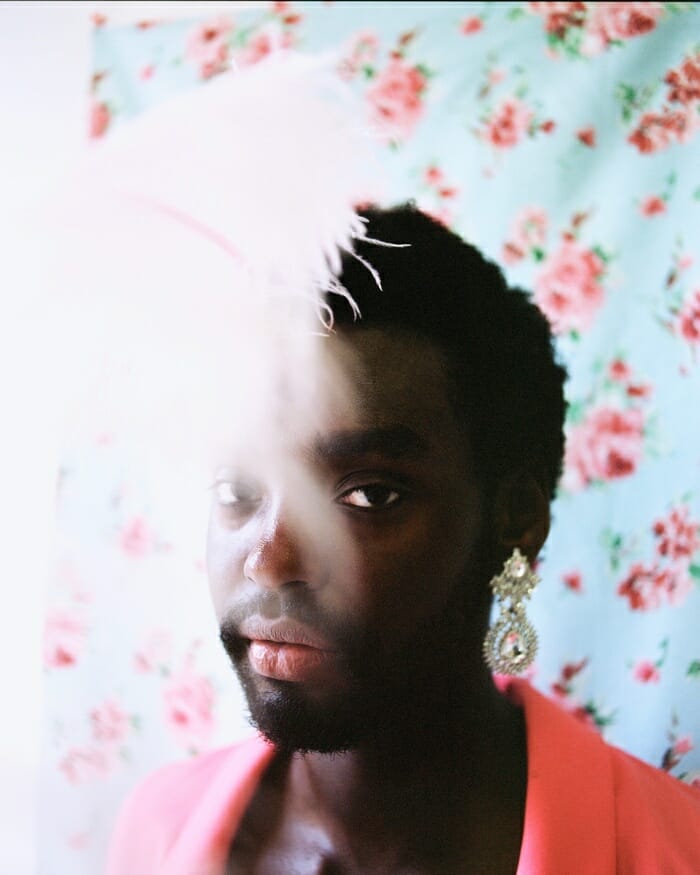
They might not get a lot of credit, but they were out there. Do you feel that you’re part of a photographic community?
Yeah, definitely. Especially right now, I mean, whether we’re directly connected or not, I think that a lot of the young, black, or POC photographers are doing a lot of great work right now, and a lot of them actually getting recognized for that which is really good. We’re all part of this up-and-coming community.
Do you do drawn on them for inspiration?
In terms of inspiration to keep making work, and inspiration of, “what were actually doing is working,” you know, to see these people getting these great opportunities that they’ve been working towards for such a long time. Yeah, I think in terms of that, they’re definitely inspirational.
Is there a sense of competition?
Yeah, sometimes it’s almost unavoidable, especially with Instagram and stuff, I talk about this all the time, how scrolling and seeing what other people are doing, and it’s like, “oh, I wish I had done this”, you know, but you don’t see the behind-the-scenes of what that person did to work towards that moment and all the conversations.
Or if they enjoyed it.
Yeah, exactly. For me, I definitely have had a pretty positive experience and I think that is because of all of the work that people before me have done to open the doors for young, black photographers to be able to shoot for brands and publications, and have their work seen by important people.
Did you enjoy your time in London?
Yeah, I enjoyed it. There were definitely times where I wanted to go home, or I missed New York, but I think it was definitely necessary and I appreciated the time I took being out there.
What do you feel you got from the experience?
I got a mini-break, basically. When I was in New York previously, before the study-abroad thing, I was in school full-time, living in the dorms and I was working as an RA, and then on top of that I was freelancing and paying for school. So it was a lot of stuff going on, and just being busy all the time. When I went to London, it was like a break because I was on a student visa, so I couldn’t work. I couldn’t really do a whole bunch, and then the British schools system, or at least at UAL, it’s very hands-off and kind of self-directed learning.
So a lot of the time I spent was outside of the classroom, and that gave me a lot of free time to just think. At first it was uncomfortable, just being alone and not really having much to do. And not really knowing what to do, because after a while I had already done the touristy things in London, so it was like, where do I even go? I didn’t have a whole bunch of friends there.
So it was a lot of just me going to the library or going out and getting materials and stuff like that. And I did make some work out there because we had to work on a final project for the course, it was continuation of this series I started in my studio class my junior year where I was taking portraits of black people with dyed hair.
So I continued that out in London and was getting people from parties that I was at, or on Instagram, because eventually I did, because like I knew a few people through Instagram in London and then they introduced me to people. And then I did a few things for some personal stuff that I’m working on, some of the stuff that I’m trying to figure out for my thesis.
It was almost like a sabbatical.
Something like that, haha! It was also good to travel, I went to Paris twice, I went to Amsterdam twice, I got to travel a bit in England.
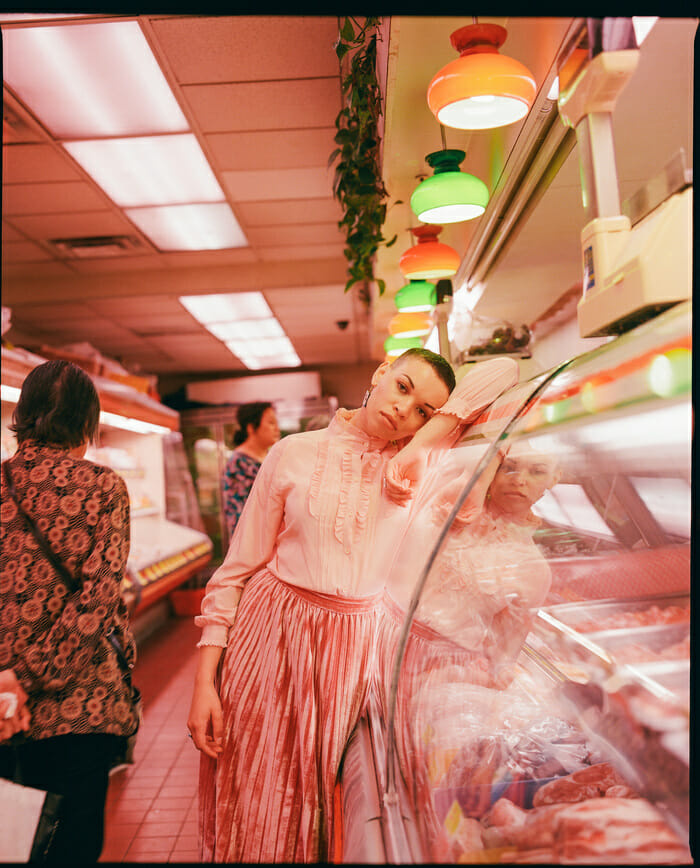

Are you a very hard editor in yourself? Do you keep a lot of your photos?
I would say no. Well, I keep a third, if I’m shooting like medium format. But if I’m shooting point and shoot, I usually keep most of those, yeah.
Do you have a particular preference right now?
I just shoot point and shoot when I’m doing quick stuff, like documentary-type things. If I’m traveling, I’ll shoot with that, or just walking around.
Are you all film, right now?
Yeah, all film. I don’t even have a DSLR, I sold mine last year.
What was the thinking behind that?
Well, I started shooting medium format sophomore year of college because in my studio class that was a requirement, we had to shoot on the Hasselblad and print black-and-white, we’d be doing 10 prints a week, it was a lot.
Oh shit!
Yeah, so that was the start of me shooting on medium format. I was always interested in film and I think it was also right around that time when I noticed a lot more fashion photographers were using medium format. I was just really interested in the look and feel of it, and film in general. I didn’t even notice at first, and then one day, I was like, “I haven’t touched my digital camera in a very long time, I might as well just like sell it.” So I just posted it on Instagram and sold it.
Do you feel like it slows you down?
Yes, definitely.
And is that something you appreciate?
Yeah, because you have to be pretty sure about what you want to photograph. I think it’s really good for portraiture and adds to that whole experience of photographing someone. Because I feel, when someone’s shooting you with digital, sometimes when you’re snapping, it can take you out of the moment. And not all digital photographers do it like that, some do shoot slower, but I feel like that’s because they did shoot film at some point. But the whole medium format thing really slows it down. You can tell someone, “okay, relax.” Because some people are just so tense. I was photographing my boyfriend this morning, and we spend basically every day with each other, but he was still putting on when I photographed him, and I had to put the camera down and tell him, “just relax!” So I definitely think it slows down time shooting with film. And also, I’m interested in the tones and colors, that’s a huge thing for me when I look at photos.

Do you feel like you you understand yourself better because of your experience with photography?
Yeah, it has helped me understand myself better. I mean, I think more so, I use it as like an outlet for all the stuff that goes on in my head and the images that come up in my mind and also wanting to use my talents to do something good.
And you want to move into film, as well?
Yeah. I really want to get into directing. I don’t know if I want to do a lot of commercial work. I mean, it would depend on what that work was, I’m really interested in working with artists, musicians and stuff. I would want to do that.
Music videos or…?
I could see myself doing that, or even just one-off things, or editorial-type type videos, but I’m also interested in art films. I worked on a short film for my junior year studio, because we were doing a whole unit on video, and it was interesting to get out of photos, and think about the moving image, because it’sso much different. And it was very nerve-wracking at first, but then, once I started actually making stuff I was like, “okay. This is actually kind of cool!”
What is it that appeals to you about motion?
You can get a lot more emotion out of it, because there’s more of a narrative and a combination of sounds and visuals. And also I’m a really, real big music person. And so that’s also a part of it, incorporating like sound…
You want to do more like narrative stuff?
Not necessarily narrative stuff. I have done that in the past, but I’m interested more in making portraits of people, and also just images that are more ambiguous, that do tell a narrative, but it’s not necessarily like one two, three. When I did the film that I was telling you about, it was a nonlinear narrative… Random Acts of Flyness had just come out, and also my professor was showing us a lot of Khalil Joseph’s work. So I was just really interested in clipping, looping clips together that weren’t necessarily in order, but still telling a story. Because I feel like I would tend to get wrapped up in, “okay what’s going to go first and next and…”, and I think sometimes it can be more interesting to do it in a way that’s not in order, because I feel like it leaves more to the viewers to interpret.
Those are the images that I’m always most drawn to, where you have to look at it for a second before you’re like, “okay, what is going on here? What does this actually mean?”
In school we read this book by Roland Barthes, Camera Obscura, I think that was the title but I may be wrong. He talks about the one thing in the photograph that makes you…say for instance you’re walking in a gallery, out of all of the prints this one photograph stands out. That’s what he calls the punctum.
It’s the hook. the thing that grabs you and I feel like that’s very rare.
Yeah! I’m also interested in like listening to people’s stories and, not necessarily telling their stories, but allowing their stories to be told through photography, or interpreting it through photography.
I’m trying to figure out how to communicate my experience in a way that’s positive and not necessarily self-deprecating, because I feel like oftentimes marginalize artists are expected to have this type of work that is super-negative. Not necessraily negative, but just talking about the oppression that you face, and “woe is me” type stuff. I’m trying to figure out in my work how to talk about that, but also have it be positive, as well.
A celebratory aspect?
Yeah, and looking towards something more positive, a positive future or positive existence.
